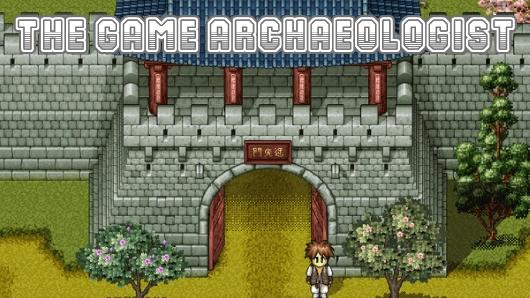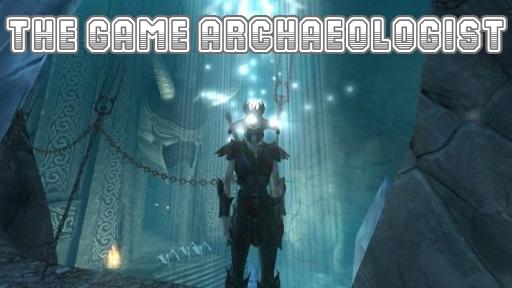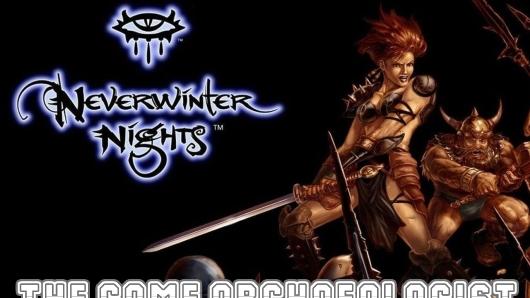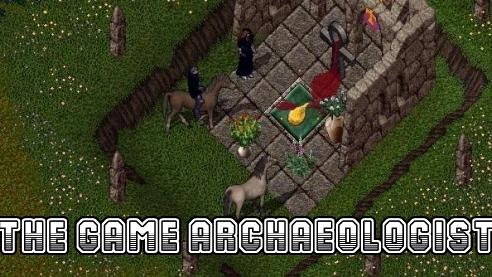game-archaelogist
Latest

The Game Archaeologist travels to Nexus: The Kingdom of the Winds
I confess that I have a particular fascination for MMOs that came into existence in the 1990s. It's not only the fact that I was oblivious to them at the time (er, wild college days?) but that practically each and every one of them were true pioneers in their own fashion. And while your standard MMO fan might think that there were only three such games in that decade (four, if they are gracious and include Meridian 59), the truth is that there were far more of them. Today we are going to look at one of the most important MMOs to emerge from that time period, Nexus: The Kingdom of the Winds, although its influence was primarily located in Korea while being vastly downplayed in North America. Still, here's a successful MMO that not only beat Ultima Online out of the door by a year but has since won a Guinness World Record for longevity!

The Game Archaeologist: How DikuMUD shaped modern MMOs
Even though there are hundreds and thousands of MMOs spanning several decades, only a small handful were so incredibly influential that they changed the course of development for games from then on out. DikuMUD is one of these games, and it is responsible for more of what you experience in your current MMOs than you even know. Of course, that doesn't mean everyone knows what DikuMUD is or how it shaped the MMOs that came out after it. You might have seen it used as a pejorative in enough comments that you know it is loathed by many gamers, but I find that there are varying degrees of ignorance about DikuMUD in the community. What is it, exactly? Why is it just the worst? And is it really the worst if we like the games that can point to this text-based MMO as a key ancestor? Today we're going to dispel the mystery and myths of DikuMUD to lay it out there as it was and is today.

The Game Archaeologist: The complete history of classic MMOs
Since this is my final Game Archeologist post of 2014, I want to indulge in a personal project that's been pulling at my shirt-tails for a little while now. I've been writing this column for years and have yet to create a proper guide to all of the games and subjects that I've covered. So that's what you're getting today: a "complete" (thus far) history of classic, obscure, and dead MMOs, arranged by decade. Ever wonder where MMOs began? Wanted to know what online gamers played back in the '90s and '80s? Trying to remember which games never made it to launch? Curious whether I've covered that little-known gem that was your doorway to a larger virtual world? Then take my hand and come with me!

The Game Archaeologist: Perpetual's Star Trek Online
If you're among the legions of Trekkies, then you are almost certainly aware of Cryptic Studios' Star Trek Online. Since early 2010, players have boldly gone where no one has gone before in this MMO that blends spaceship battles, ground combat, and faithful tie-ins to the long-running franchise. Star Trek Online appears to be thriving following a free-to-play adaptation and two expansions, and some see it as the only official continuation of the TV series right now. But what players encounter in Star Trek Online is not what it originally started out as. You may or may not know that STO began development under Perpetual Entertainment, which handled the game for several years until it went bankrupt and passed the license and art assets to Cryptic. It's another tantalizing historical "what if?" scenario to think about what this game would look like if Perpetual had taken it to launch and beyond. But what did this version of Star Trek Online look like? Let's investigate.

The Game Archaeologist: Four online sci-fi titles no one remembers
In the MMO industry, science fiction has always taken the role of the overlooked little brother to big sister fantasy's popularity. Sure, there have been several online games that eschewed dungeons and dragons for spaceships and solar radiation poisoning, but even today the fantasy genre continues to be the dominant one in the genre. So not only have we had fewer online sci-fi games, but the ones that have attempted to make in-roads are all too soon forgotten. Over the years that I've been researching and writing The Game Archaeologist, I continue to come across these little games that have been all but forgotten by modern gamers, and many of these titles are indeed of a sci-fi bent. This week I'll be taking a look at four such games, including one that never even made it to launch, in an attempt to acknowledge their place at the family dinner table.

The Game Archaeologist: The Chronicles of Spellborn
Hey! Hey you! Yeah, you the I'm-so-bored-with-all-of-these-MMOs gamer! You've been grousing about for years how MMOs never take risks, never innovate, and are merely content to rehash the same-old fantasy tropes that were stale even when World of Warcraft launched, right? Yes, we at Massively saw your poorly spelled reddit post on that subject, thank you. Well, what if I were to tell you that there's an MMO that bucks the clichés? It's true! Imagine an MMO that exists in a post-apocalyptic fantasy setting that's unlike anything you've seen before. Imagine that combat isn't merely hotbar button mashing but tactics mixed with positioning. Imagine that you can create your character to look any way you want from the onset instead of having to collect certain pieces of gear. Imagine an immersive world that is a delight to the eyes and ears. Got all that? Want to play it? Well, you can't. That game was The Chronicles of Spellborn, and since you and pretty much everyone else on the planet ignored it, it tanked in 2010 after less than a year of operation. Yet for its lackluster run, Spellborn has been strongly mourned by those who saw tremendous potential in it and who keep creating internet petitions to bring it back. Because petitions change everything. Today we're going to take a look back at an MMO that took the path less traveled.

The Game Archaeologist: The return of Habitat
After over four years of writing for Massively, I've ceased to be surprised by how bizarre and unexpected this industry can be. However, if you had told me a few weeks ago that, of all things, Habitat would be coming back online, I would have laughed mightily in your face. And yet, that's exactly what's happening. The Museum of Arts and Digital Entertainment has taken up the challenge to restore LucasFilm's Habitat to working condition and then, for the first time ever, open this original virtual world up to the internet to play. Museum staff, former Habitat devs, and volunteers have been wrestling with the old code and hardware to make this happen, and I can think of no better topic for this week's column than to look at how this 28-year-old game for the Commodore 64 will emerge blinking in the light of the modern era. I reached out to MADE's director, Alex Handy, to chat about the project and get clarification concerning what steps will need to be taken between now and the moment the switch is thrown to power up Habitat.

The Game Archaeologist: How Hellgate survived being Flagshipped
It seems that it really wasn't too long ago that I was filling in the time between night classes by boning up on video game news. I was drinking up all of the hot up-and-comers, such as Age of Conan and Warhammer Online, when I caught word that the maker of Diablo was trying to do the same thing again, only more online, in 3-D, and with a cool modern-day/futuristic/horror vibe. There's no better way to put it than to say that from the start, Hellgate: London looked all kinds of cool. Oh sure, you can scoff now with your perfect 20/20 hindsight, but I'm betting that more than a few of you thought the same with me around that time. Diablo but with guns and an online persistence -- how could we not be intrigued? One of my most vivid memories was being torn between the idea of buying a lifetime subscription deal for $150 (again, this was before the free-to-play era, but also before the era of us spending the same money on alpha access. I'm just saying that you can't judge me.). I didn't buy the lifetime sub, if you were wondering, but I did play. I even enjoyed Hellgate: London for a month or so, although something about it never quite clicked with me. It was only after I bailed that I watched with horror that one of the most infamous chapters of video game disasters took place. It's kind of like when you look at pictures of an earthquake and say to anyone near, "I was just standing there a week ago..." From its giddy heights of pre-launch hype to the crash simply known as being "Flagshipped" to its subsequent resurrections (yes, plural), Hellgate is a fascinating tale of a good idea, a terrible launch, corporate scapegoating, and improbable survival.

The Game Archaeologist: Ironman modes and elective permadeath
One facet of video games that's been around almost since the very beginning is the difficulty level. This has allowed the player to choose how hard or easy a game would be from the onset, influencing factors such as the number of enemies, hardiness of bad guys, fragility of the player character, and available loot (or lack of it). I used to love how some of those '90s shareware titles would mock me for picking easy, sometimes portraying my character wearing a baby bonnet and sucking its thumb. Real gamers, the devs implied, go tough or go home. With a few exceptions, MMOs operate on a fixed level of difficulty for all of their players. Instead of assigning blanket difficulty client-side, the game world portions difficulty into areas, usually according to level or activity. Some games have instances with adjustable difficulty levels, but past that what you get is also what I get. This might be changing. A very fringe but dedicated group of players have championed such ideas as elective ironman and permadeath modes for their MMOs, and at least one studio is responding positively to that desire. Would you choose to make your MMO experience harder than everyone else in exchange for nothing more than a bigger challenge and a more "realistic" experience?

The Game Archaeologist: Six more MMOs that never made it to launch
It's always possible to be surprised with reveals of older MMOs, even after years of writing this column. For example, I had never heard that Valve was initially working on an MMO called Prospero in the late '90s before we posted on it a couple of weeks ago. It's crazy to me that parts of what could have been a groundbreaking online title were then repurposed for Half-Life and Portal. It's not necessarily bad how things turned out, mind you, but I do get lost wondering what might have been. From time to time here on The Game Archaeologist, I like to turn our attention to MMOs-that-never-were: titles that died before launch thanks to funding shortfalls, studio collapses, or corporate bungling. We've covered titles like Wish, Ultima X, and Middle-earth Online, but today I want to catch up on several titles that have been haunting my list for a while now. So strap in as you get a six-pack of MMOs that were never released!

The Game Archaeologist: Kingdom of Drakkar
You'd think that by now I would be running out of older MMOs and their kin to cover, but I just keep discovering more. Some of those discoveries are helped by Massively readers, who have urged me from time to time to investigate certain games. One such commenter, Space Cobra, has been after me for quite a while (as in years) to do a write-up about Kingdom of Drakkar, and I finally caved. Here you go, good buddy! Kingdom of Drakkar, also known as Drakkar or Kingdom of Drakkar II, is a really odd duck in the MMO history books. While being very small potatoes for the industry as a whole throughout its entire lifespan, it's notable for an extraordinary long run (it began in the 1980s, people!) that's traversed through several format changes and handlers. I've seen it described, somewhat unkindly, as a "shoddier Ultima Online," but I think that is a surface judgment that doesn't take the effort to get to know the game or its legacy. There must be something to this game if it's been around for three decades, yes? Let's find out!

The Game Archaeologist: World War II Online
The 1990s saw the rise of flight simulators that thrived on detailed, complicated controls and handling. Such games threw out accessibility and casual-friendliness for stark-raving realism, and a certain subset of gamers really thrived on them. I tried my hand at a couple and found myself breathing rapidly when pouring through keyboard charts and doing basic algebra just to get a plane off of the ground. Not for me, I said then. I don't think there's ever stopped being absurdly complex video games that aim for immersion through detailed realism, even though that appeals to only the fringe of the fringe. Some people have their gaming standards set exactly that high and no lower, and some devs refuse to water down their visions just to sell more box units. For these people, Cornered Rat Software (CRS) created World War II Online, an overly ambitious MMOFPS that stumbled out of the gate in 2001 but has gamely soldiered on since then. Over a decade now an epic war has been raging for control over a continent, and it's been up to the fiercely loyal fans to keep the fight going. Today we're going to take a look at the guts 'n' glory of this project to both praise its complexity and curse it for the same thing. If nothing else, it was a game that could only have arisen from the early landscape of 3-D MMOs, and for that it warrants our attention.

The Game Archaeologist: Tales from Neverwinter Nights' Arelith
Back in May, I touched on the fascinating field of Neverwinter Nights' persistent worlds (PWs). I never expected it to draw so much attention, least of all from the folks still running these communities. But it did, and I was contacted by one of the player developers of Arelith, Mark "Artos" Friebus. Artos and his colleagues wanted to share more about the history and makeup of this 12-year-old server and why, in 2014, they're still as crazy about doing it as ever. If you want an insider's point of view as to what goes on in a persistent world -- and perhaps are open to be tempted to roll a character on one of them -- then stay tuned for the fascinating tale of Arelith.

The Game Archaeologist: The persistent worlds of Neverwinter Nights 1 & 2
At the end of next month, dozens of online worlds will flicker and vanish with the flip of a switch. It's a online apocalypse the likes of which we have not seen in quite some time, although you might be forgiven for not having heard of it before now. When GameSpy Technology goes offline on May 31st, dozens of EA games that relied on the platform for multiplayer functionality will lose their online components by June 30th. Because of this, Neverwinter Nights and Neverwinter Nights 2 will find that their persistent player-made and -run worlds are in danger. For over a decade now, players have poured creative energies and roleplaying enthusiasm into these micro-MMOs. Could an era be about to end? Fortunately, players are already swinging into action to work around the shutdown, keeping their worlds alive and detached from GameSpy's umbilical cord. I see this event as a wake-up call for people like yours truly who are acquainted primarily with BioWare and Obsidian's single-player offerings and are ignorant of the larger Neverwinter Nights community out there. Let's take a look at this engrossing online realm and how it came to be.

The Game Archaeologist: The silent world of Tibia
If I were to tell you that there's a Western MMO out there that's as old as Ultima Online and yet still has a half-million players, would you believe me? Heck, I wouldn't believe me even if I came back from the future of having written this article to talk to the past version of me who had yet to start it! But that's Tibia for you: a weird underdog of an MMO that's cruised underneath most players' radars for over a decade and a half. From its origins as a student project, Tibia jumped in the unexplored waters of the early MMO era and dog paddled for all its worth. This 17-year-old title remains one of the very few active MMOs from the '90s and one of only a handful that stubbornly stuck to a 2-D graphics format even as 3-D swept the gaming genre. And trust me, those aren't even the most interesting facts about it!

The Game Archaeologist: The danger of expecting lightning to strike twice
It's no secret that many of the more successful Kickstarter projects over the past few years have heavily capitalized on player nostalgia, brand names, and former dev gods who are back for another round. The formula for drawing in the big bucks seems to be the following: Take something players hugely loved back in the day, dangle the concept of a sequel (spiritual or otherwise), and promise some measure of iterative improvement. I once wrote about how we really can't go back again to recreate a particular game experience because it was usually a confluence of several factors that were related to where the industry was then and where you were then. I'm not saying that there isn't value to retro gaming, playing classic MMOs, or involving the past in future development! But there is a danger in how we as gamers become so beholden to our nostalgia that we dare lightning to strike twice -- and we're paying big bucks to see that happen. But can we? Will it?

The Game Archaeologist: Myst Online: Uru Live
The impact of Myst in 1993 was akin to an atomic bomb going off in the PC gaming world. The leap forward in graphical fidelity (aided by the large storage capacity of a CD-ROM and all of the full-motion video and gorgeous images tucked into it) captured gamers' imaginations and made this adventure title the best-selling PC game of all time, at least for several years. Brothers Robyn and Rand Miller's story about a stranger who had to solve puzzles through a good-looking (if deserted) landscape was devilishly difficult, yet that challenge kept players coming back for months and even years. The Myst franchise surged forward at that point, with several sequels, remakes, and ports selling like hotcakes through the final game's release in 2005. Yet something interesting happened along the way when an offshoot of the series -- Uru: Ages Beyond Myst -- evolved into an MMO. With a focus on multiplayer exploration and puzzle-solving instead of non-stop combat, it may be one of the very few MMOs out there that eschews fighting for brainpower. It's an oddity, no doubt, and despite it being an incredibly niche title, it has fascinated me enough to pull me into a research rabbit hole. So let's take a look at Myst Online: Uru Live!

The Game Archaeologist: Ultima Online field report
A recent Daily Grind here on Massively asked about what games readers think deserve more coverage on the site. That's a loaded question, of course, but the answers were still very interesting to me, especially the desire from some of you to read more about older games. Even though I've looked at the history and development of classic MMOs, I don't often know what's going on inside of them right now. With insular communities and a dearth of news being put forth by the studio, the only way that I can think of to find out the real skinny is to ask those who do still love and play these games regularly. So that's when the idea for a "field report" series on Game Archaeologist came forth. Every so often I'm going to track down players of classic MMOs and see what's happening in them and their communities from these first-hand perspectives. Today we've got Dimitri and Common Sense from Ultima Online, who graciously took the time to answer my questions.

The Game Archaeologist: The care and feeding of older MMOs
When an MMO has reached a certain age and dwindled to a certain player population, what do you do with it? Do you put it out to pasture, nurture it, or put it down? With some of our older graphical MMOs approaching their 20th anniversaries, the question of what studios should do with aging titles is becoming very important. It's not just important for the games in question but as a precedent to the population of games that will one day become just as old. Lately we've seen different studios act on this topic in a wide variety of ways, all of which I find fascinating. Some of these games have seen tragic ends, while others may be entering into the enjoyable golden years. If nothing else, it's shown me that there isn't just one set answer for this and that some devs are hoping to do the right thing by their companies and their players.

The Game Archaeologist: Is Turbine working on Asheron's Call 3?
If you look at the list of major MMO studios, it seems as though many of them have something new in the works or recently launched a title. Sequels and sandboxes are the trendy topics of the time, garnering attention and enthusiasm from the community. And then there's Turbine. As a fan of the "powered by fans" studio and an avid player of Lord of the Rings Online, I have always kept my eye on these Bostonians. While Turbine helped lead the charge on free-to-play adaptations and has kept DDO and LotRO hopping with expansions, its last major MMO launch was 2008. The only known new game that's in the works over there is the Infinite Crisis MOBA. Or is it? What if there's another project that's being kept on the down-low, one that could be a comeback attempt to propel Turbine back into the community spotlight? What if Turbine is working on Asheron's Call 3? I have scant proof that this is so but plenty of suspicion and speculation as to why it may be the case. Plus, the possibility stirs the imagination.
